Morgan Meyer
A group of eight graduates of the engineering school AgroParisTech gave a notorious speech at their school’s last graduation ceremony. In their speech, they denounced the “destructive” jobs, the “social and ecological devastation” underway and the “war” on life and peasantry waged by agribusiness. While the agro-industrial complex is directly pointed at, many concepts and notions are also criticized – and physically put in inverted commas – such as “challenges”, “ecological” transition, or “green” energy.
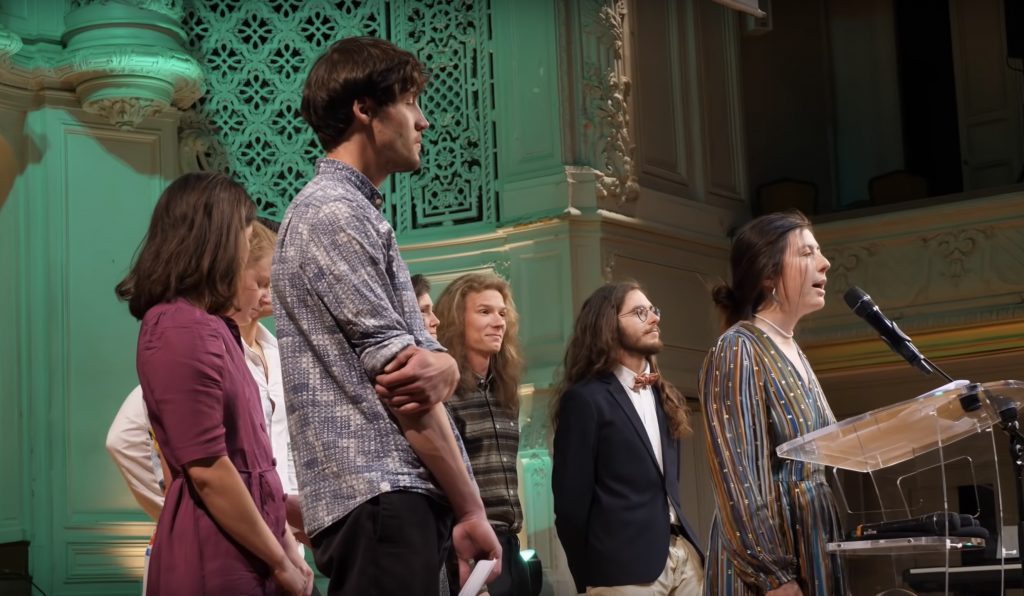
In their speech, the group displays a taste for punchlines and mobilizes a certain dramaturgy and theatricality, as in the following passage:
“But what kind of life do we want? A cynical boss, a salary that allows you to take a plane, a 30-year loan for a house, just 5 weeks per year to relax in an unusual gite, an electric SUV, a fairphone and a loyalty card at Biocoop? And then… a burn-out at forty?”
The group claims to be inspired by having met “people who experiment with other ways of life”. The speech, far from being limited to a frontal criticism of the “system”, also testifies to commitments and career choices. It ends with a suggestion of possible futures:
“You can change direction now. You can start a traineeship to be a peasant baker, go wwoofing for a few months, take part in a construction site in a ZAD or elsewhere, get involved in a self-managed bicycle workshop, or join a weekend of struggle with Soulèvements de la Terre. It can start like that”.
AgroParisTech was forced to issue a press release in view of the extent of the debate. The institution explains that there is a “multiplicity of points of view” and a “diversity of solutions”, reminds us that its graduates work in various sectors (research, business, politics, nature management/protection, etc.) and contrasts the intervention of the eight graduates with “those – more numerous – of their peers who have chosen other paths”. This is a way of saying that the eight graduates defend a marginal point of view. The current director of AgroParisTech, for his part, judged the speech to be “excessive”, “radical” and “a bit fatalistic”.
In this article, I aim to explore the specificity of the criticisms made. To do this, I will first analyze other types and forms of criticism, some of which were formulated by actors in the agricultural world and others by engineering students from top-ranking engineering schools (grandes écoles). This analysis and contrast will allow me to highlight the originality of the speech. It will also allow me – and this is my main argument – to argue that we must move beyond the notion of “criticism” (and a sociology of critique) because it does not do justice to the complexity of the speech.
Mocking, blocking, denouncing: the repertoires of criticism
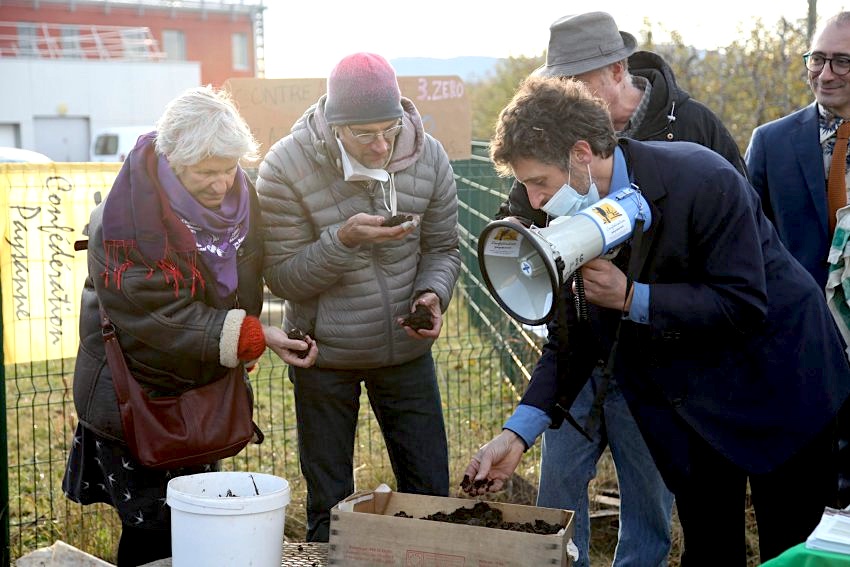
The AgroParisTech students’ call to “desert” brings to mind other forms of what I call “staged criticism”. For example, in response to the hackathon organized by the Ministry of Agriculture and its project on robotics, digital technology and genetics, the Confédération Paysanne de la Drôme organised a critical and playful counter-competition, called “cacathon” [1]. On the one hand, there was a prize-giving ceremony for the hackathon held at the Bourg-lès-Valence Chamber of Agriculture. At the same time, a competition took place inviting farmers to bring their “best manure, compost, worm juice” to win prizes such as a “golden dung”, “recognition” and “satisfaction”. The counter-competition was also an opportunity to voice criticism – via speeches and placards – of the “technology fad” and “productivism”.
A second example – much more radical and disruptive and which takes us away from the agricultural world for a moment – is the blocking by the collective Pièces et Main d’œuvre of a public debate in April 2013 as part of the Forum on Synthetic Biology [2]. In order to saturate the space of the debate visually, verbally and physically they brandished posters (“Participating means accepting”), put stickers on the walls and the floor (notably “at this very moment King Kong is destroying Genopole”), repeated slogans, read a declaration, distribute pamphlets and told the public to go home. The criticisms made by Pièces et Main d’œuvre can be qualified as radical and “total”, since they condemned the practices, objectives, products, institutions, and debates (considered as a “masquerade”) linked to synthetic biology.
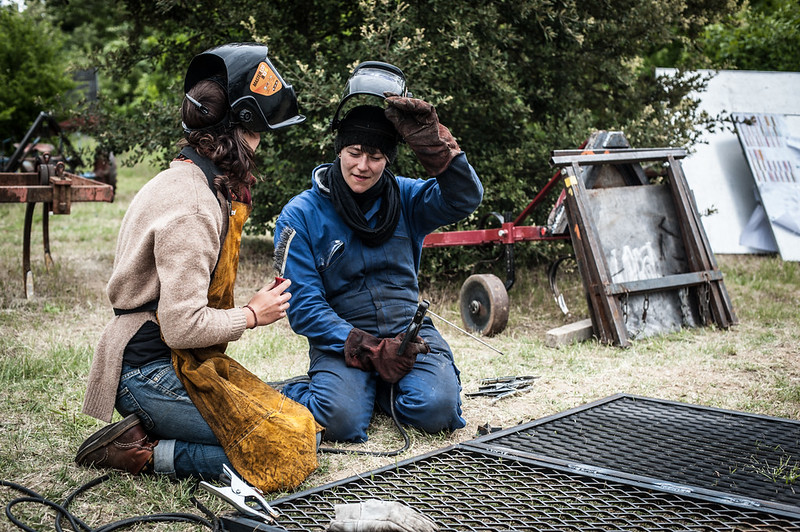
Apart from these rather spectacular examples, there are also criticisms that focus more specifically on agricultural machinery, such as those made by the auto-construction cooperative Atelier Paysan. In its latest book, Reprendre la terre aux machines – Manifeste pour une autonomie paysanne et alimentaire [3], the cooperative makes a long list of critical observations: increase of the average surface of farms, decrease of the active agricultural population, over-indebted farmers, dependence on private actors, high production of waste, devaluation and disappearance of know-how, environmental and sanitary damages, degradation of the soil, increase in the use of pesticides, growing and excessive machinery, poor nutrition, too much faith in digital technologies and robotics, and a race to keep production costs low. For Atelier Paysan, we must fight against excessive, patented, and standardized technologies that are impossible to repair and adjust by the farmers themselves, and favor “human-sized”, appropriate, repairable, adaptable, and “free” technologies.
Becoming a “deserter”
These few examples show that the critique of the agricultural world can mobilize a diversity of strategies, repertoires and socio-material forms. On the one hand, the group of the AgroParisTech graduates formulates critiques that are similar to those made by other actors – critique of productivism and capitalism, critique of technicism. But on the other hand, the moment and the public of the staging are quite singular. It is not an already constituted collective that expresses itself (like the Confédération Paysanne or Atelier Paysan), but a collective that has become, on the 30th of April 2022, the “deserters” of AgroParisTech. And their speech is not addressed to a ministry, an institution, or a political entity, but above all to a particular social group – the recent and future graduates of AgroParisTech – and a very specific and personal issue that concerns them: their career choice.
The deserters’ speech has been widely discussed and dissected in social networks and the media. It has been hailed, as much as it has been labeled “anti-science”, “green”, or “leftist”. But the discussions have mainly focused on the critical aspect of the speech, even though the latter cannot be summed up by the word “critical” alone. It should be remembered that the speech mentions several experiences that were inspiring, that it specifies the professional choices of the eight graduates, and that at the end it proposes several forms of engagement. Alongside the criticisms of the existing world, we must therefore also retain all these positive, committed and open elements, which describe a world to be made. I believe that it is this double play between desertion and engagement, between criticism and hope, between the personal and the institutional level that gives the enunciation its rhetorical force.
Criticism within engineering schools
This is not the first time that students from AgroParisTech have spoken out in public in this way. The project to transform their campus at Grignon in the Yvelines region has been the subject of many discussions and a recent demonstration. And in 2018, two anonymous AgroParisTech students criticized the “rapprochement” between their school and industrial actors, with criticisms similar to those made by the “deserters”. In their article [4], they criticize the links between AgroParisTech and companies such as Vinci and Syngenta, while denouncing the “propagandist atmosphere […] draped in grand speeches about ‘sustainable development’, ‘ecology’, or ‘green’ agriculture’” at the Forum Vitae recruitment fair.
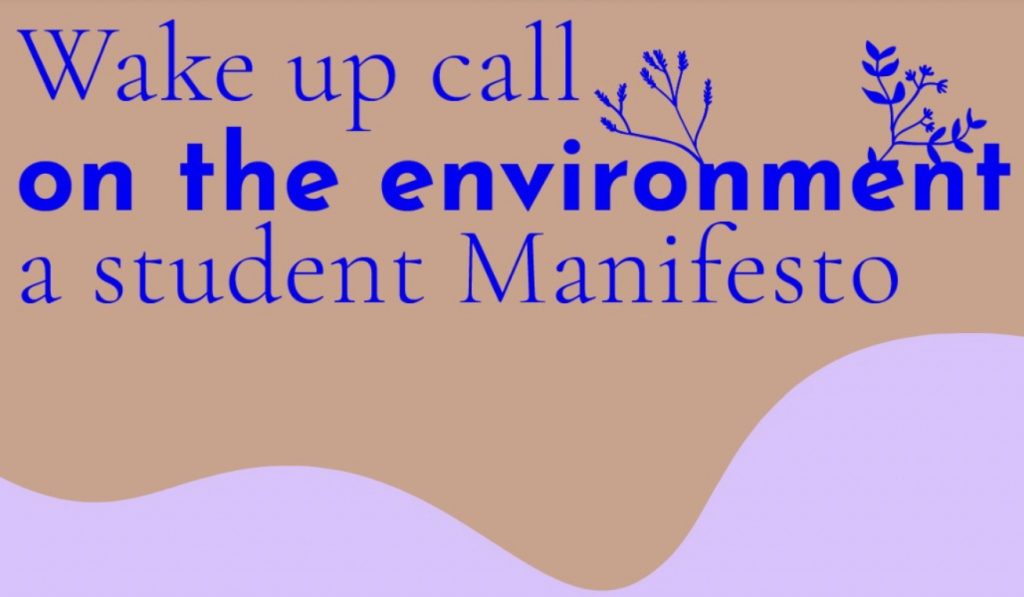
In other engineering schools, we have seen similar stances in recent years. During the 2018 graduation ceremony at Central Nantes, for example, the speech of a newly graduated engineer denounced capitalism, faith in progress and “solutions”, and his school’s partnerships with industrial actors. And, also in 2018, the “Student Manifesto for an Ecological Awakening” (Manifeste étudiant pour un réveil écologique) [5] was launched by a group of students from various grandes écoles – Polytechnique, ENSTA, HEC, ENS – and subsequently signed by 30,000 signatories. The manifesto aims to “include a social and environmental ambition in our daily life and our jobs, in order to change course and not end up in a dead end” and criticizes the fact that “the system of which we are part of directs us towards positions that are often incompatible with the fruit of our reflections and locks us into daily contradictions”. A manifesto that is also not just concerned with criticisms: the desire for inclusion (of certain values) and the desire for “compatibility” are just as important.
What kind of sociology?
Finally, the speech of the “deserters” provides also an opportunity to reflect on the place of sociology in engineering schools in general. The (rare) academic articles on the subject explain that sociology is called upon to: contribute to the construction of the professional identity of future engineers, facilitate the understanding of professional environments and the issues that they face, make engineers sensitive to the socio-cultural dimensions of technology, and finally consider the impacts of technology on society as well as in companies [6, 7]. Sociology can therefore provide reflexivity and a capacity for self-criticism and put current problems into a wider context, while being based on surveys and fieldwork.
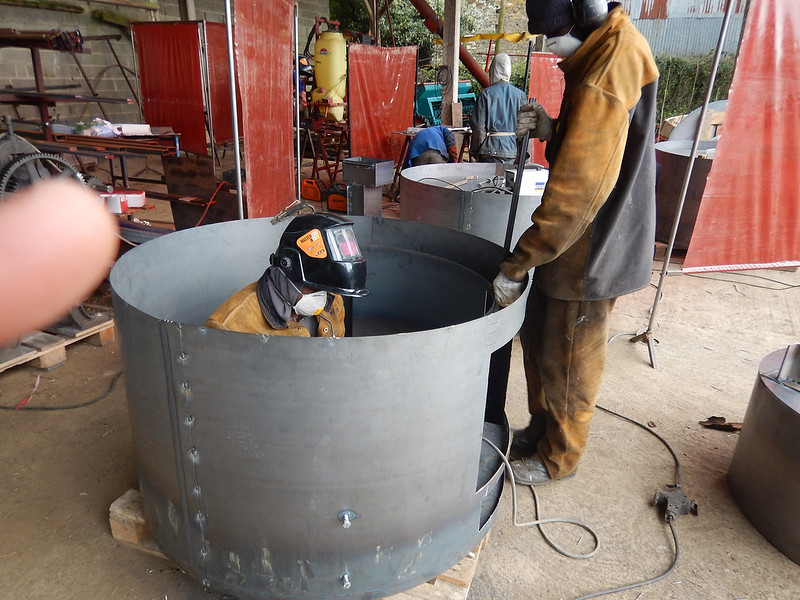
Should existing courses – such as those on socio-technical controversies, on the place of engineers in the “city”, on alternative agri-food systems [8] – be enriched by proposing new courses and encouraging more reflexivity? Should we explain to students and colleagues the tenets of the sociology of critique, or even do an “archaeology of critique” [9]? Perhaps. But if we try to force the deserters’ speech too much into the convenient box “criticism”, we risk overlooking certain essential elements.
For the deserters’ speech is based on what they experience as dissonances and incompatibilities between societal models, between different ways of interpreting concepts, between training and profession. A sociology of these situations of incompatibility, whether they are conceptual, professional, emotional or institutional, is therefore needed. Such an analysis – of which this article has only provided a first sketch – must resituate the publics to which criticisms are addressed, whether it is an engineering school and its young and future graduates, a ministry, or other actors. Such an analysis must also analyze how criticisms of the current world are connected to engagements in the field and professional choices. For in asking people to “change direction” (bifurquer), a double call has been made: a call to desert and a call to commit oneself [10].
June 1st, 2022.
Also read: Morgan Meyer, S’engager, bifurquer, déserter. Pragmatique des critiques et sensibilités écologiques des élèves ingénieurs. i3 Working Papers Series, 22-CSI-01, December 2022.
[1] Confédération Paysanne de la Drôme (2021) Appel à mobilisation dimanche 5 décembre à 14h à Bourg-lès-Valence [last accessed : 16 May 2022].
[2] Meyer, M. (2017) « “Participating means accepting”: debating and contesting synthetic biology », New Genetics and Society, 36(2), 118-136
[3] L’Atelier Paysan (2021) Reprendre la terre aux machines – Manifeste pour une autonomie paysanne et alimentaire, Paris : le Seuil
[4] Deux étudiant-e-s d’AgroParisTech (2018) « Pourquoi sortons-nous de l’école avec des valeurs à l’exact opposé de celles qui nous ont motivés à y entrer ? », Basta!, publié le 3 janvier 2018 [last accessed : 16 May 2022]
[5] Wake up call on the environment: A Student Manifesto [last accessed : 16 May 2022].
[6] Dufour, A. (1999) « Les enjeux de l’enseignement de la sociologie dans une école d’ingénieur », Ruralia – Sciences sociales et mondes ruraux contemporains, n° 5
[7] Lejeune, M. (2015) « L’apport de la sociologie de la technologie à la professionnalisation de l’ingénieur », Phronesis, 4(2), 34-41
[8] Title of some of the courses taught by the UFR Sociologies at AgroParisTech (to which the author belonged from 2013 until 2017).
[9] See Barthe, Y., Lemieux, C. (2002) « Quelle critique après Bourdieu? », Mouvements (5), 33-38
[10] Let’s also note that the deserters of AgroParisTech launched on the 19th of May 2022 a call to « meet » in media such as Reporterre, Basta! and Mediapart.
Photo credit #1 : Appel à déserter – Remise des diplômes AgroParisTech 2022. April 30, 2022, salle Gaveau, Paris [photo from the video].
Photo credit #2: Richochet, Participatory media in the Drôme, counter-power & free expression. Retour sur l’action paysanne du dimanche 5 décembre : le cacathon ! “Concours de fumure devant la chambre d’agriculture de la Drôme à Bourg lès Valence” [“Manure competition in front of the Drôme Chamber of Agriculture in Bourg lès Valence”.].
Photo credit #3: L’Atelier Paysan – AXP_1671- “Chantiers et initiations en plein air lors des Rencontres 2017“.
Photo credit #4: Wake up call on the environment: A Student Manifesto, 2018.
Photo credit #5: L’Atelier Paysan – “Four à Pain – Trévero“. Training on the Bread Oven at the Trévero farm in pictures, in April 2019.

